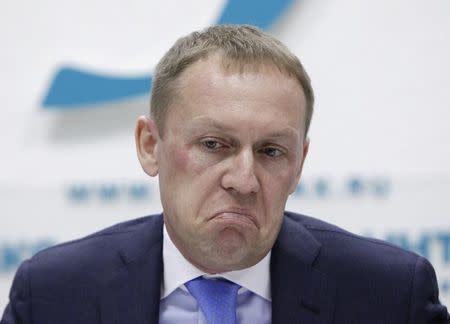Russian accused of murdering ex-KGB agent given UK inquiry deadline
By Michael Holden LONDON (Reuters) - One of two Russians accused of murdering ex-KGB spy Alexander Litvinenko with a radioactive poison in London in 2006 was given a final chance on Monday to give evidence to a British public inquiry into the death. British authorities say there is evidence to prove Dmitry Kovtun, along with fellow Russian Andrei Lugovoy, poisoned Kremlin critic Litvinenko with green tea laced with polonium-210 at the Millennium Hotel in central London. Before his death, Litvinenko accused Russian President Vladimir Putin of ordering his killing and Robert Owen, the chairman overseeing the British inquiry, has said there was a "prima facie case" indicating Russian involvement. However, the Kremlin has always denied any role, as have Lugovoy and Kovtun, whom Russia has refused to extradite. In March, Kovtun, who had initially refused to take part, changed his mind and asked to appear before the inquiry. He was due to start giving evidence by videolink on Monday. However, last week he said he had received legal advice that he was bound by an obligation of confidentiality to an ongoing Russian investigation into the death, and that if he appeared without the permission of the Russian authorities he would be committing an offence. The inquiry was told on Monday Kovtun had said he had been unable to get that permission. Chairman Owen said the late intervention gave rise to the "gravest suspicion" that Kovtun was attempting to manipulate the situation to give the appearance he was willing to cooperate. He said he would "reluctantly" give Kovtun a deadline of Tuesday at 9 a.m. to agree to give evidence. Ben Emmerson, the lawyer for Litvinenko's widow Marina, said "It appears that these proceedings are being manipulated in a coordinated way between Mr Kovtun, the murderer, and the Russian state that sent him to commit the murder - a continuation of a collaboration that began in 2006." The inquiry heard on Friday that, while in Germany a month before Litvinenko was poisoned, Kovtun had told a witness he needed a cook to put an expensive poison into the ex-spy's food or drink. Kovtun himself told a news conference in April that Litvinenko, whose death helped drag relations between Moscow and London to new post-Cold War lows, might have killed himself accidentally while handling polonium. The public inquiry is due to issue its report into the death by the end of the year. (Editing by Stephen Addison)

 Yahoo News
Yahoo News 

